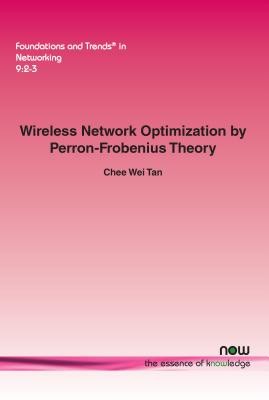
- We will send in 10–14 business days.
- Author: Chee Wei Tan
- Publisher: Now Publishers
- ISBN-10: 1680830503
- ISBN-13: 9781680830507
- Format: 15.6 x 23.4 x 0.7 cm, softcover
- Language: English
- SAVE -10% with code: EXTRA
Wireless Network Optimization by Perron-Frobenius Theory (e-book) (used book) | bookbook.eu
Reviews
Description
A basic question in wireless networking is how to optimize the wireless network resource allocation for utility maximization and interference management. How can we overcome interference to efficiently optimize fair wireless resource allocation, under various stochastic constraints on quality of service demands? Network designs are traditionally divided into layers. How does fairness permeate through layers? Can physical layer innovation be jointly optimized with network layer routing control? How should large complex wireless networks be analyzed and designed with clearly-defined fairness using beamforming? Wireless Network Optimization by Perron-Frobenius Theory provides a comprehensive survey of the models, algorithms, analysis, and methodologies using a Perron-Frobenius theoretic framework to solve wireless utility maximization problems. This approach overcomes the notorious non-convexity barriers in these problems, and the optimal value and solution of the optimization problems can be analytically characterized by the spectral property of matrices induced by nonlinear positive mappings. It can even solve several previously open problems in the wireless networking literature. This survey will be of interest to all researchers, students and engineers working on wireless networking.
EXTRA 10 % discount with code: EXTRA
The promotion ends in 20d.15:34:09
The discount code is valid when purchasing from 10 €. Discounts do not stack.
- Author: Chee Wei Tan
- Publisher: Now Publishers
- ISBN-10: 1680830503
- ISBN-13: 9781680830507
- Format: 15.6 x 23.4 x 0.7 cm, softcover
- Language: English English
A basic question in wireless networking is how to optimize the wireless network resource allocation for utility maximization and interference management. How can we overcome interference to efficiently optimize fair wireless resource allocation, under various stochastic constraints on quality of service demands? Network designs are traditionally divided into layers. How does fairness permeate through layers? Can physical layer innovation be jointly optimized with network layer routing control? How should large complex wireless networks be analyzed and designed with clearly-defined fairness using beamforming? Wireless Network Optimization by Perron-Frobenius Theory provides a comprehensive survey of the models, algorithms, analysis, and methodologies using a Perron-Frobenius theoretic framework to solve wireless utility maximization problems. This approach overcomes the notorious non-convexity barriers in these problems, and the optimal value and solution of the optimization problems can be analytically characterized by the spectral property of matrices induced by nonlinear positive mappings. It can even solve several previously open problems in the wireless networking literature. This survey will be of interest to all researchers, students and engineers working on wireless networking.


Reviews